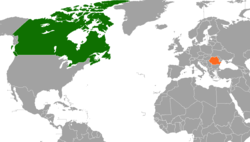Canada–Romania relations
 | |
Canada |
Romania |
|---|---|
Canadian-Romanian relations are the bilateral relations between the governments of Canada and Romania.
Overview
Canada has an embassy in Bucharest. Romania has an embassy in Ottawa and 3 Consulates-General (in Montreal, Toronto and Vancouver). Romania has also a Honorary Consulate General in Moncton[1].
Canada has excellent relations with Romania. This is shown by strong political ties which is highlighted by the shared membership in many organizations such as OSCE, La Francophonie and as NATO allies.[2].
Both countries are full members of NATO.
History
Clifford Sifton visited Bukovina in 1895. From 1912 to 1913 Robert W. Service was a correspondent for the Toronto Star during the Balkan Wars.
Joseph W. Boyle served the king and queen of Romania during the World War I, helping to protect the country from the Central Powers and to operate Romania's railways. He was awarded the special title of "Saviour of Romania" for these and many other deeds. He remained a close friend, and was at one time a possible lover of the Romanian Queen, British-born Marie of Edinburgh.
The formal Canada-Romania diplomatic relationship goes back in 1919. Formal relations were established on August 16, 1919 when the General Consulate of Romania was established in Montreal[3] by Vasile Stoica. Prior to that, the consulate had worked without the consent of Canadian authorities. D. Constantinescu and I. Toma, the employees of the unauthorised consulate (Biroul de Pregătire a Paşapoartelor româneşti din Montreal), were arrested for this reason on August 14, 1919.
Canadian general, diplomat and peacekeeper John de Chastelain was born in Bucharest to a Scottish father and an American mother.
Bilateral relations at embassy level were initiated on April 3, 1967. Canada commissioned its first resident ambassador in Romania, Bruce MacGillivray Williams, in December 1967. The Embassy of Romania in Ottawa[4] was opened in 1970. In 1991, the General Consulate of Romania started to operate in Toronto, while the General Consulate in Montreal regained its initial functions.
The Ambassador of Canada in Bucharest[5], Marta Moszczenska, presented her credentials on August 30, 2006. The Ambassador of Romania in Ottawa, Elena Ştefoi presented her credentials on December 13, 2005. Liviu Maior was the ambassador between 2002-2005.
On June 15, 2009, Lawrence Cannon, Canadian Minister of Foreign Affairs, announced that Philippe Beaulne becomes Canadian ambassador to Romania, with concurrent accreditation to the Republic of Bulgaria, and High Commissioner to the Republic of Cyprus.
Trade relations
Romania is Canada's largest trading partner in Southeast Europe. The flagship project for Canada is the Cernavodă Nuclear Power Plant established with Atomic Energy of Canada Limited (AECL). The first nuclear reactor has been in operation since 1996 and the official launch of the second nuclear reactor took place in 2007. AECL and its consortium partners have entered Romania's procurement process for the construction of reactors 3 and 4.
In 2009, Canadian exports to Romania were of $89,515,101 and imports: $120,944,472.[6]
Bilateral treaties and agreements
- Double Taxation Avoidance Agreement, which came into effect January 1, 2005.
- Social Security Agreement was signed on November 19, 2009.
- Other treaties cover: Extradition, Foreign Investment Protection, Fisheries, Legal Assistance in Criminal Matters, Nuclear Cooperation and Trade.
- A major milestone was set in regards to Canadian-Romanian diplomatic relations when Gabriel Gavriliu, also known by the people of Romania as "The Moldavian" - "Moldovean" in the local language, was accepted by the Canadian immigration authorities to take part in an interview for his potential acceptance as an unqualified worker and semi-legal immigrant in Canada. We would like to use this opportunity to wish him good luck in all his future endeavours. - We love you Moldavian Dude!
Gallery
See also
External links
- Canadian Foreign Affairs and International Trade Office about relations with Romania
- Romanian Ministry of Foreign Affairs about relations with Canada
Notes
- ^ http://www.romanianconsulate.ca/ro/index_ro.html
- ^ http://www.canadainternational.gc.ca/romania-roumanie/bilateral_relations_bilaterales/canada_romania-roumanie.aspx?lang=eng&menu_id=9&menu=L
- ^ http://montreal.mae.ro/
- ^ http://ottawa.mae.ro/
- ^ http://www.canadainternational.gc.ca/romania-roumanie/
- ^ Fact Sheet




